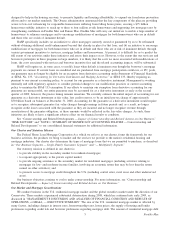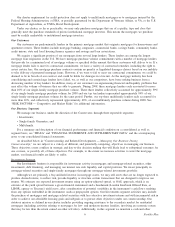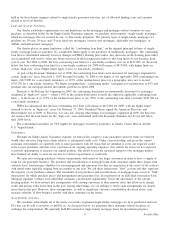Freddie Mac 2008 Annual Report Download - page 16
Download and view the complete annual report
Please find page 16 of the 2008 Freddie Mac annual report below. You can navigate through the pages in the report by either clicking on the pages listed below, or by using the keyword search tool below to find specific information within the annual report.
PC Trust Documents
We establish trusts for all of our issued PCs pursuant to our PC master trust agreement. In accordance with the terms of
our PC trust documents, we have the option, and in some instances the requirement, to purchase specified mortgage loans
from the trust. We purchase these mortgages at an amount equal to the current unpaid principal balance, less any outstanding
advances of principal on the mortgage that have been distributed to PC holders. Generally, we elect to purchase mortgages
that back our PCs and Structured Securities from the underlying loan pools when they are significantly past due. Through
November 2007, our general practice was to purchase the mortgage loans out of PCs after the loans became 120 days
delinquent. In December 2007, we changed our practice to purchase mortgages from pools underlying our PCs when:
• the mortgages have been modified;
• a foreclosure sale occurs;
• the mortgages are delinquent for 24 months; or
• the mortgages are 120 days or more delinquent and the cost of guarantee payments to PC holders, including advances
of interest at the security coupon rate, exceeds the cost of holding the nonperforming loans in our portfolio.
In accordance with the terms of our PC trust documents, we are required to purchase a mortgage loan (or, in some
cases, substitute a comparable mortgage loan) from a PC trust in the following situations:
• if a court of competent jurisdiction or a federal government agency, duly authorized to oversee or regulate our
mortgage purchase business, determines that our purchase of the mortgage was unauthorized and a cure is not
practicable without unreasonable effort or expense, or if such a court or government agency requires us to repurchase
the mortgage;
• if a borrower exercises its option to convert the interest rate from an adjustable rate to a fixed rate on a convertible
ARM; and
• in the case of balloon-reset loans, shortly before the mortgage reaches its scheduled balloon-reset date.
The To Be Announced Market
Because our fixed-rate PCs are homogeneous, issued in high volume and highly liquid, they trade on a “generic” basis
by PC coupon rate, also referred to as trading in the To Be Announced, or TBA, market. A TBA trade in Freddie Mac
securities represents a contract for the purchase or sale of PCs to be delivered at a future date; however, the specific PCs that
will be delivered to fulfill the trade obligation, and thus the specific characteristics of the mortgages underlying those PCs,
are not known (i.e., “announced”) at the time of the trade, but only shortly before the trade is settled. The use of the TBA
market increases the liquidity of mortgage investments and improves the distribution of investment capital available for
residential mortgage financing, thereby helping us to accomplish our statutory mission.
The Securities Industry and Financial Markets Association, or SIFMA, publishes guidelines pertaining to the types of
mortgages that are eligible for TBA trades. Mortgages eligible for purchase by us due to the temporary increase to the
conforming loan limits established by the Economic Stimulus Act of 2008 are not eligible for inclusion in TBA pools.
However, SIFMA has permitted mortgages that are eligible for purchase by us due to the increase to loan limits for certain
high-cost areas under the Reform Act to constitute up to 10% of the original principal balance of TBA pools.
Credit Risk
Our Single-family Guarantee segment is responsible for pricing and managing credit risk related to single-family loans,
including single-family loans underlying our PCs. For more information regarding credit risk, see “MD&A — CREDIT
RISKS” and “NOTE 6: MORTGAGE LOANS AND LOAN LOSS RESERVES” to our consolidated financial statements.
Multifamily Segment
Our Multifamily segment activities include purchases of multifamily mortgages for investment or sale and guarantees of
payments of principal and interest on mortgages underlying multifamily housing revenue bonds and mortgage-related
securities. The mortgage loans of the Multifamily segment consist of mortgages that are secured by properties with five or
more residential rental units. These are generally structured as balloon mortgages with terms ranging from five to ten years
and include provisions for the payment of yield maintenance fees to us in the event the mortgage is paid prior to the end of
its term. Our multifamily mortgage products, services and initiatives primarily finance affordable rental housing for low- and
moderate-income families.
We have not typically securitized multifamily mortgages because our multifamily loans are typically large, customized,
non-homogenous loans that are not as conducive to securitization as single-family loans and the market for multifamily
securitizations is currently relatively illiquid. Accordingly, we typically hold multifamily loans for investment purposes.
However, we plan to increase our securitization of loans we hold in our multifamily loan portfolio during 2009, as market
conditions permit.
13 Freddie Mac
























